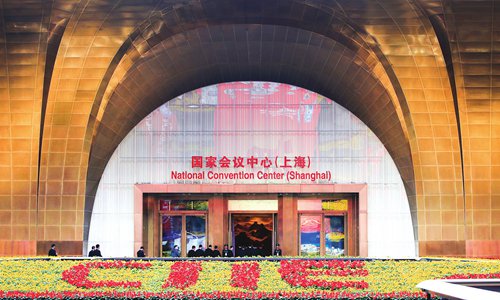HOME >> BUSINESS,SPECIAL-COVERAGE
CIIE to meet demand by France, Europe to enter Chinese market
By Yang Sheng and Ma Jingjing Source:Global Times Published: 2019/11/4 22:58:40
EU should partner with Chinese companies via joint 5G development

A view of the CIIE venue on Monday. Photo: Yang Hui/GT
French President Emmanuel Macron arrived in China on Monday to kick off a state visit and drum up business deals, with experts noting his trip shows France's confidence in China's economy and a promising China-EU relationship.
Senior EU officials and other leaders of European countries have also attended the CIIE, and this is a sign that boosting economic ties with China is a shared goal of Europe, experts said.
Macron's state visit from Monday to Wednesday will include a series of diplomatic activities including a meeting with Chinese President Xi Jinping and attending the opening ceremony of the second China International Import Expo (CIIE), the Foreign Ministry in Beijing previously announced.
Macron will attend the CIIE along with other senior EU officials including the incoming EU Trade Commissioner Phil Hogan, Reuters reported.
Macron has no reason to refuse support for the CIIE or developing China-France trade ties, as France is experiencing better GDP growth than Germany and other EU members. Also, France's confidence is rising, and it needs more external reinforcement, such as increasing exports to China, to consolidate this trend, Cui Hongjian, director of EU Studies at the China Institute of International Studies, told the Global Times on Monday.
As China and the US are about to reach an interim deal to ease the pain from the US-launched trade war, France and the EU are worried that Europe's interests could be affected. To some extent, Macron's trip is intended to make sure China won't sacrifice the interests of the EU or France even if a trade deal is reached with the US, Cui noted.
Macron will seek to make China deliver on promises to grant more access to foreign companies, eyeing agribusiness and finance, Reuters reported.
Although China and France are complementary in terms of their economies, China-France trade was about $60 billion in 2018, which is one-tenth the scale of China-US trade and one-third of China-Germany trade.
A major reason for the large difference is that China-France cooperation is concentrated on giant enterprises but small or medium-sized companies are not involved too much, Ding Yifan, a professor at Beijing Foreign Studies University, told the Global Times on Monday.
"So the French government should actively push French small and medium-sized companies to expand cooperation with China. This can increase trade and stabilize bilateral trade ties," Ding noted.
Yin Zheng, global executive vice president of French multinational Schneider Electric, told the Global Times on Monday that "With the opening of the 2nd CIIE, we believe China will become more open and inclusive, and accelerate its integration into economic globalization."
Yin said the company will continue its localization strategy and actively participate in China's new round of higher-level opening-up. "We plan to expand research investment in China by 50 percent in the next three years, while also stepping up cooperation with our Chinese partners… to make more contributions to the building of an open world economy," Yin said.
During the first CIIE in 2018, France sent 69 companies to join the expo and transactions reached $1.55 billion. Experts noted that French companies will set a new record this year.
China-EU trade ties
Apart from Macron, other European countries' leaders including Greek Prime Minister Kyriakos Mitsotakis, and Serbian Prime Minister Ana Brnabic will also attend the second CIIE opening ceremony. Chinese experts noted that boosting economic and trade cooperation with China is a shared goal for most European countries.
European exhibitors continue to show great enthusiasm for this year's CIIE, China's Foreign Ministry spokesperson Geng Shuang said at a press briefing on Monday.
About 17 European countries will participate in this year's national exhibition, and countries including France, Italy, Greece and the Czech Republic will attend as guest countries, according to Geng.
"We believe European companies will arrive in high spirits and return home with satisfaction," Geng said.
Overall economic cooperation between China and the EU has increased in the past few years, but problems still exist, Zhao Junjie, a research fellow at the Chinese Academy of Social Sciences' Institute of European Studies, told the Global Times on Monday.
"Despite the complementary nature of China-EU trade, competition exists in certain sectors like machinery and electronics," Zhao said, noting that the EU believes that bilateral trade benefits China more - hence, there is increased trade protectionism.
As the fourth industrial revolution develops, China and the EU should strengthen economic cooperation for mutual benefit, according to Zhao. "The information and internet sector is the EU's weak point, far lagging behind China. In this regard, the EU should step up cooperation with China, for which jointly developing 5G technologies is meaningful," Zhao said, adding that China should learn from the EU in the areas of advanced manufacturing and finance.
The new EU Commission should take a win-win attitude toward trade with China as well as a bilateral investment treaty (BIT), Zhao said. He said he hopes the two sides can reach a consensus on the BIT in 2020.
Newspaper headline: CIIE to help European firms enter China